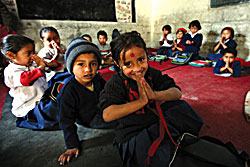 KIRAN PANDAY |
At the heart of the disagreement lies a five per cent increase in taxes on private schools that the government says will be used for public school reforms in remote areas of the country.
Private schools, already taxed as private companies, are up in arms over this proposal and say the tax is an extra burden to parents and guardians of their students.
Leading the protest over the tax is the Private and Boarding Schools' Organisation, Nepal (PABSON) that says private schools registered as companies were already paying 25 per cent tax on incomes. Under existing rules, private schools also have to give scholarships to 10 per cent of students. "Most private schools will not be able to handle a rise of five per cent in taxes," says Bhoj Bahadur Sha, President of PABSON, "This is a violation of a fundamental human right to education."
PABSON submitted a strong memo to the education ministry and the prime minister earlier this month. PABSON and other educational organisations took out newspaper advertisements last week condemning the proposed tax rise.
The architect of the tax is Finance Minister Baburam Bhattarai, and he asks schools to trust the government to use the money properly to improve the quality of the government school system.
"We guarantee it is only used for public school reforms," Bhattarai tells Nepali Times. "It will strengthen the public education system, but it doesn't mean the private schools should be closed down."
Acknowledging the dissatisfaction with the proposed tax, Bhattarai says the five per cent tax on admission and tuition fee was taken up from recommendations from a task force set up to study ways to improve public schools. He adds,"It is up to the schools to decide if they want to transfer it to parents. We don't interfere."
But private educators feel they have paid their dues to society by providing quality education to Nepalis, something they say government schools do not. To drive home this point, Principal of Advanced International Model School, TR Dhakal, says 14.2 per cent of government school students pass their School Leaving Certificate at the end of Grade 10, whereas more than 70 per cent do so in private schools.
Public schools are also sorely lacking in basic facilities to provide a conducive environment for learning, says Dhakal, who is also secretary-general of PABSON.
To upgrade public schools, funds spent on these schools should be more accountable for and properly spent. Dhakal feels the money should be drawn from other sources instead of cannibalising resources from the private education sector.
Rajan Suwal, principal of Khwopa College in Bhaktapur, agrees that the five per cent tax is a bad idea, "The government thinks all private schools are rich and families who send their children there are wealthy but that's just not the reality."
Bhaktapur is a model for cheap quality education which is subsidised by the municipality. Some private schools here charge only Rs 50 to 200 per month in fees-unheard of anywhere else.
Even private school owners who are supportive of the idea to channel more funds to public schools say they are not confident that revenue from the proposed tax will be used for reforms in public education.
"Unless there is a mechanism to ensure the money is distributed to the poor areas, it is unlikely it will happen," says Dhakal. He adds that funds spent on public schools are already mismanaged, resulting in a severe lack of basic facilities in institutions.
Umesh Nepal, principal of Manjushree High School, has even harsher words on the five per cent tax. "This money will never go to the poor. It will only feed the Maoist cadres."


